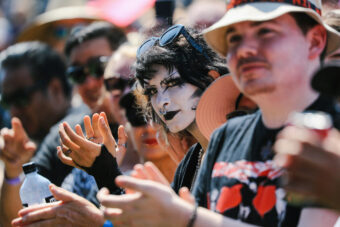Release Date: June 19, 2012
Label: Island/RBMG
Justin Bieber is a singer. His maniacal fanbase of (mostly) teenagers will never forget that, but the rest of us sometimes struggle to recall that the formerly mop-headed icon actually makes music. After all, his career is arguably more about the power of a new strand of social media and the reawakening of teen idolatry than anything artistic. He rose up as a YouTube and Twitter meme, and in some respects will always be one; many people could recall their favorite Belieber RT before they could sing any of his choruses.
But in the grand scheme of his career, all this is rather insignificant: Kids know and love those songs, their parents will pay for them (and then pay again to see them performed in arenas), and everyone will make more than enough money. But, with Believe — his first non-Christmas album in two years — Justin Bieber is, for the first time, showing the desire to define who he is as an artist beyond merely being popular. Since he may be the biggest star in popular music, this is a significant development.
It should be noted upfront that Believe doesn’t feature any moments of transcendence as pure as Justin Timberlake’s first post-teen pop singles, nor is it, um, Off the Wall. But those are selectively high benchmarks. Neither JT nor Michael Jackson (nor anyone, really) was a fully formed artist as a teenager, and Bieber certainly isn’t immune to the process of fumbling around for an identity. He’s already the prince of pop, and the crucial takeaway here is that despite Believe being a deeply imperfect album, there are enough successes to indicate that any attempts to ascend the throne will avoid Joffrey Baratheon-level embarrassment.
But that, too, may undersell both the artist and the album, which aims for the same crossover attempted this year by both Nicki Minaj and Usher, but in reverse. While those two projects embraced dance music as a way to broaden their audiences beyond rap and R&B, Bieber is slowly worming his way onto R&B radio, where his music reaches whole new sets of ears — ones attached to bodies that can, say, legally drink. And here’s both the most shocking and most important development: That transition (artistically speaking, at least) is going better for Bieber than for his competition. Believe doesn’t drip with singularity like the best of Nicki’s Roman Reloaded, nor does it feature as many great songs as Usher’s Looking 4 Myself, but it holds together as a full album better than either. That’s arguably not saying much, but for fans of pop music, it’s encouraging that Bieber is traversing the choppy, tumultuous waters of contemporary pop more deftly than his elders.
Part of his ability to do so admittedly lies within our own biases: Unlike Minaj or Usher, we expect little from Bieber, so it’s harder for him to let us down. But Believe‘s highlights are split between R&B and dance-pop, and it works even when those styles are slotted back-to-back — a rarity in 2012. The album kicks off with “Around the World,” a radio-ready house thumper, but one whose understated lushness segues adroitly into lead single “Boyfriend,” where Bieber nods to Timberlake by perfectly copping the acoustic funk of “Like I Love You.” (As an economizing bonus, he also raps, thus playing the role of the Clipse as well.) “As Long as You Love Me” tests his maturing voice by asking him to sing over a glorified brostep track, and he’s up to the task; but the song’s (and album’s) greatest moment comes when producer Darkchild summons a chorus by slicing Bieber’s trademark falsetto into ribbons of cascading confetti. Meanwhile, “Take You” melds R&B and house beats as deftly as anyone since the reign of Ne-Yo, and “Right Here” is a sweet, fluttery duet with Drake that proves, once again, that Aubrey’s true talents lie in R&B, first and foremost. These tracks cover an impressive amount of sonic ground without inducing whiplash, and they stand as some of the best pop songs of the year.
Unfortunately, not everything goes as smoothly. The borderline adult contemporary ballads “Catching Feelings” and “Fall” are particularly wretched, as is the title-track closer. “Beauty and a Beat” (which would’ve been a great boy-band song in another era, but is now cut open with jarring, wigged-out Skrillex drops) and “Thought of You” are anonymous radio fodder. Bieber also has trouble coming off as a human being. “All Around the World,” for instance, hinges on bizarrely alien lyrics (“All around the world, they’re no different than us”), and on “As Long as You Love Me,” he likens the pinnacle of human connection to jewelry. He also still falls back far too much on bland, meaningless platitudes, and though that shouldn’t be unexpected from a young star who’s as much a ‘brand” as a singer, it does run counter to the way Bieber approaches his music.
Which brings us to the extras. Like many pop albums of recent vintage, Believe would be greatly improved if its three worst songs were switched out for its three “bonus” tracks, which provide a glimpse of what may lie ahead. The album proper ends with a trio of sappy Hallmark weepers meant to leave everyone feeling warm and inspired, but from there you’re plunged into turmoil, with songs about cheating, suffocating fame, and Mariah Yeater, the woman who infamously (and falsely) claimed Bieber was the father of her child. Here, the 18-year-old fully transforms from generically grinning pop avatar to a singer with a voice — and if he can keep pushing in that direction, he may yet threaten to stand among pop’s legends, instead of merely basking in their shadows.





